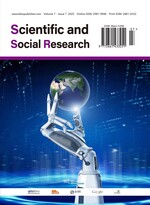Abstract
From its origins in the Germanic dialects of the 5th century, English has evolved into today’s global lingua franca, with its development profoundly shaped by translation practices. This paper analyzes how translation has driven linguistic innovation in English—through mechanisms such as lexical borrowing, grammatical restructuring, and cultural transmission—across five key historical phases: Old English, the Middle Ages, the Renaissance, the Industrial Revolution, and contemporary globalization. The findings suggest that the translation of Latin religious texts laid the foundation for theological discourse in Old English; Anglo-Norman translations after 1066 contributed to the shift toward analytic grammar; vernacular Bible translations democratized and standardized religious vocabulary; classical translations during the Renaissance underpinned the emergence of academic discourse; and modern technological translation and cross-cultural exchange have solidified English’s status as a global language. Translation has functioned as a “cultural gene converter”, shaping the linguistic form of English while enhancing its adaptability to diverse cultural contexts—thus acting as an intrinsic force behind its global proliferation.
References
SIL International, 2023, Ethnologue: Languages of the World (26th edition). SIL International, Dallas.
Oxford University Press, 1989, Oxford English Dictionary (2nd edition). Oxford University Press, Oxford.
Hogg R, 1992, The Cambridge History of the English Language, Vol. 1. Cambridge University Press, Cambridge.
Townend M, 2002, Language and History in Viking Age England. Brepols Publishers, Turnhout.
Crystal D, 2003, The Cambridge Encyclopedia of the English Language, 2nd ed. Cambridge University Press, Cambridge.
Keynes S, Lapidge M, 1983, Alfred the Great: Asser’s Life of King Alfred and Other Contemporary Sources. Penguin Classics, New York.
Durkin P, 2015, Borrowed Words: A History of Loanwords in English. Oxford University Press, Oxford.
Dove M, 2007, The First English Bible: The Text and Context of the Wycliffite Versions. Cambridge University Press, Cambridge.
Daniell D, 2001, William Tyndale: A Biography. Yale University Press, New Haven.
Venuti L, 2017, The Translator’s Invisibility. Routledge, London.
Li YF, Gao SB, 2023, Applied Translation Studies: On Knowledge Reproduction of Translation Communities. Contemporary Foreign Languages Studies, 2023(6): 30–38.
Chen YJ, 2021, “Language Contact” and the Evolution of the English Language in the Middle Ages, thesis, Northeast Normal University.
Baugh A, Cable T, 2002, A History of the English Language (5th ed.). Routledge, London.
Zhang YX, 2014, From English to Globlish. Foreign Language Teaching and Research Press, Beijing.
McArthur T, 2003, Oxford Guide to World English. Oxford University Press, Oxford.
